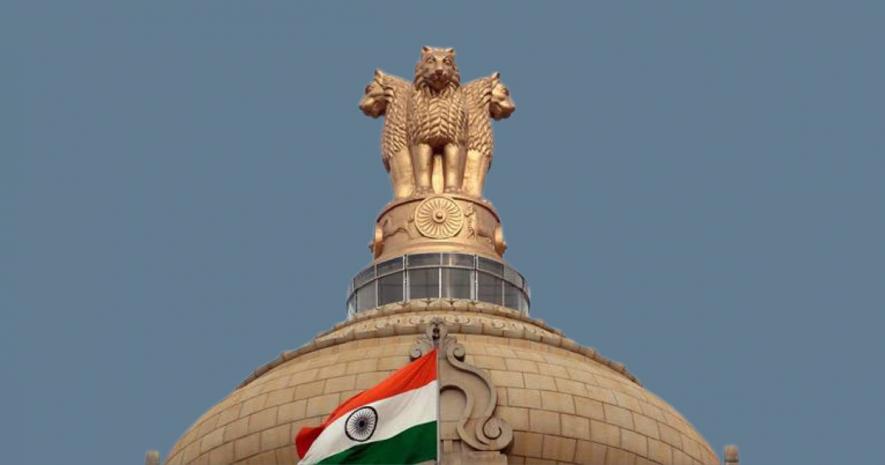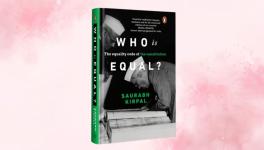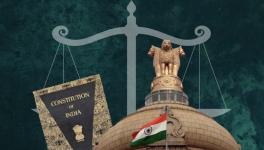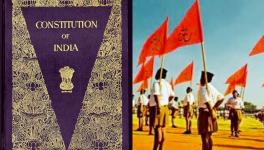Oath ‘in the name of god’ is against the spirit of Constitution

A few Bharatiya Janata Party MLAs from Karnataka recently inducted into the Cabinet took oath in the name of a pantheon of god and goddesses—Gaumata, Seva Lal, Vijayanagara Virupaksha and Bhuvaneshwari, among others. The oaths were unconstitutional and contrary to the essence of secularism enshrined in our Constitution, which calls for an amendment in the light of the decay of constitutional values.
Preamble without god
One of the last issues vigorously debated in the Constituent Assembly in October 1949 was the framing of the Preamble. BR Ambedkar proposed “We, the people of India …” as the opening statement of the Preamble.
On the contrary, a few other members, including HV Kamath, moved an amendment to the Preamble to include the words “In the name of God, we, the people of India”. Kamath’s proposal was opposed by several other members on the ground that a Preamble in the name of god would amount to the compulsion of faith and infringe the fundamental right of freedom of faith.
Calling for rejection of Kamath’s amendment, Rohini Kumar Chaudhuri contented that if invocation in the name of god was to be held valid, then it should also be amended to “In the name of the goddess”. “We, who belong to the Sakthi cult, protest against invoking the name of god alone, completely ignoring the goddess. If we bring in the name of God at all, we should bring in the name of the goddess also,” she argued.
Kamath’s proposal was finally rejected by the Assembly, which stated that a collective view should not be imposed on any individual and that the Preamble assured liberty of thought, expression, belief and faith to every citizen. This engendered the birth of an agnostic constitution of the world’s largest democracy.
Religion and the republic
Despite a secular Preamble, the Third Schedule of the Constitution provides an option to either swear in “the name of God” or “solemnly affirm” depending upon the belief of the individual undertaking the oath.
Clarifying the position on the use of names of gods and god-men, the Supreme Court (SC) in the Umesh Challiyil case, 2012, ruled that oath should be either taken in the name of god or solemnly affirmed. It should be in strict compliance with the wordings in the Constitution. The word ‘god’ cannot be misconstrued or replaced with the names of any god-men, the court said.
Challiyil, an MLA from the Kodungallur constituency, Kerala, had taken oath in the name of his guru Sri Narayana Guru. His swearing-in was challenged in a public interest litigation filed in the Kerala High Court (HC). The court declared his oath void, saying that he had deviated from the exact words of the Constitution and taken the oath “in the name of Sri Narayana Guru”. Subsequently, Challiyil challenged the HC order in the SC submitting that his oath should be considered valid as he believed that Sri Narayana Guru was his god.
Perhaps, the apex court had reaffirmed the essential principles of secularism and in the light of that verdict, the oath of the new ministers of Karnataka should be declared null and void. Further, being a public servant and a representative of the whole population of India, a minister cannot take oath in the name of a particular god, goddess or god-man.
Separation of State and religion
Though the word ‘secular’ was inserted by the 42nd Amendment to the Constitution of India in 1976, the apex court established the fact that India was secular since the formation of the republic in S.R. Bommai vs Union of India (1994).
“To the State, all are equal and are entitled to be treated equally. In matters of State, religion has no place,” the SC had observed. The Constitution mandates the State to be secular in thought and action and the same extends to political parties as well.
“Politics and religion cannot be mixed. Any state government which pursues non-secular policies or non-secular course of action acts contrary to the constitutional mandate and renders itself amenable to action under Article 356 (President’s rule), the court had further observed.
Comparative analysis: UK and USA
Analysis of the United Kingdom’s Constitution on religion is complicated by its unwritten nature. There is no specific code, legislation or convention that accords secularism a constitutional status. However, the Human Rights Act, 1998, which incorporates most of the rights mentioned in the European Convention of Human Rights, protects freedom of conscience and religion.
The Church of England enjoys certain constitutional privileges as compared to other religions in England. Therefore, the UK may be termed as ‘secularist’ rather ‘secular’ in matters relating to the State.
The First Amendment of the US Constitution states that “Congress shall make no law respecting an establishment of religion or prohibiting the free exercise thereof …” The American Constitution doesn’t refer to god despite the customary practice of the incoming President to utter the words “So, help me god” at the end of the oath. The usage of the word ‘god’ is not mandatory.
India, in the recent past, has witnessed the fraying of the quintessential constitutional fabric that defines the secular pluralism of India by the Citizenship Amendment Act, which singles out a minority community, the imposition of majoritarianism and the lynching in the name of god.
Irrespective of any person’s religious belief or non-belief, the allegiance of such person holding a constitutional position must be only to the Constitution. The republic of India belongs to the multi-religious plural citizenry of this nation, and a person occupying a constitutional position must take oath in the format of “solemnly affirm” rather than “in the name of god” to protect the ideals enshrined in our Constitution. Therefore, an amendment to this effect becomes imperative to preserve the secular fabric of India.
(Vasanth Adithya J, the founder of Kreetam Law Associates, is a practising advocate at the High Court of Karnataka, and author of ‘Conceptual foundations of Competition law in India’ The views expressed are personal.)
Get the latest reports & analysis with people's perspective on Protests, movements & deep analytical videos, discussions of the current affairs in your Telegram app. Subscribe to NewsClick's Telegram channel & get Real-Time updates on stories, as they get published on our website.
























